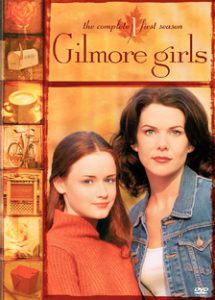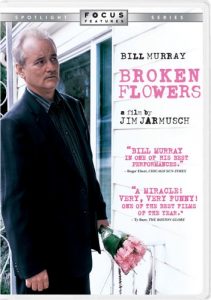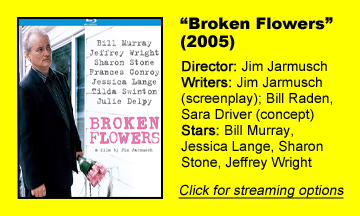I’ve been reading a fair amount of old books lately (as readers of my Sleuthing Sundays series know) and I notice characters often pause for “minutes” while thinking during a conversation (For example: “Poirot thought for a few minutes before answering”).
It’s possible that “minutes” is not meant literally in old fiction, but even so, there’s no question life used to move at a slower pace. Writer-director Jim Jarmusch’s “Broken Flowers” (2005), although set contemporaneously, harkens back to that pace.
Taking his time
We know the speed of life is on his mind because one of the funniest scenes finds two teen girls on a bus rapidly gossiping, oblivious to the people around them (except a cute guy at the back). By contrast, Bill Murray’s middle-aged lothario Don Johnston (“JohnsTon,” with a “T”) moves at an old-school pace, although it’s out of ennui more than being contentedly old-fashioned.
Viewing “Broken Flowers” upon its release, I found it hilarious that Jarmusch cuts from a shot of Don sitting unmoving on his couch for 20 seconds to another shot of him sitting in the airport unmoving for 20 seconds.
This is partly because we’re conditioned to laugh at Murray and partly because it’s a highly unusual editing decision. Although the pauses aren’t literally minutes long, conversations likewise move slowly in this film.
As well-to-do Don road-trips to pop in on four exes — one of whom wrote an unsigned letter saying he has a 19-year old son — we see the plane, bus and rental car journeys, and sometimes Don’s inner visions. Yes, this movie shows him thinking.
The leisurely attitude is necessary for capturing Don’s headspace (in other words, cutting 15 minutes off this film would hurt it, even though the narrative would not change a bit), but it will turn off a good chunk of the potential audience. I noticed it a lot more on this viewing, a sign that life has sped up even more since 2005.
Soaking up the mystery
“Broken Flowers” washes over you. We soak up clues in the mystery of “Who sent the letter?” We might be disappointed that there’s no definitive answer. Then we go online to read theories. This movie gets better the more you think about it, as you realize the tangible mystery is only one mystery. The point of the film is also a mystery – in a good way.
That’s not to say it’s vague or misleading. Indeed, an all-star cast (Sharon Stone, Frances Conroy, Jessica Lange and Tilda Swinton) sees that each of Don’s exes pops off the screen as their reactions to his pop-in range from thrilled to hostile.
If one sees Don as a continuation of Murray’s “god” from “Groundhog Day,” then these women went a degree of crazy from not staying with Don. My unexamined gut reaction was that “Broken Flowers” is about relationships – and maybe the women themselves — broken by Don’s inability to commit.

But that’s not necessarily right. Viewing the women as individuals who exist outside of Don, as one should, it’s clear that Don wouldn’t have had good futures with any of them.
Other memorable turns come from Alexis Dziena (who should have a bigger career than she does) as the casual nudist Lolita, Christopher McDonald as perhaps the least-punchable character he’s ever played, and Julie Delpy (Don’s current, estranged girlfriend) and Jeffrey Wright (Don’s neighbor and best friend) as the two people that want to jumpstart Don out of his phase of sitting on his couch staring into space.
What’s worth worrying about?
A thematic companion piece to both the hilarious “Groundhog Day” and the meditative “Lost in Translation,” “Broken Flowers” mulls past, present and future and gets you thinking about which of those three phases of reality is worth worrying about.
It’s also about lots of other things, many of which I haven’t thought of but someone online probably did. Regardless of what you decide it’s about (there’s no right or wrong answer; indeed, Jarmusch believes viewers create the meaning, not him), it’s impressive to make a movie that I continue to dwell on without being able to say what its point is.


